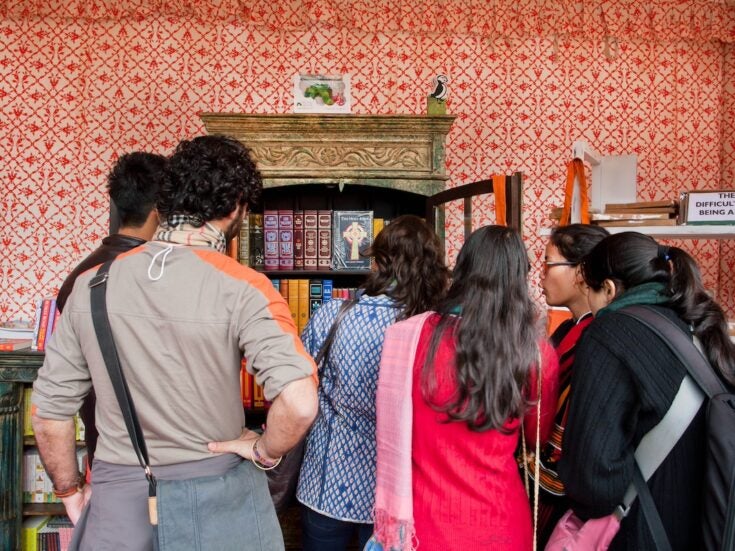
Cold Steel: Britain’s Richest Man and the Multi-Billion Dollar Battle for a Global Empire
Tim Bouquet and Byron Ousey
Little, Brown
This exciting, populist book, that focuses on Mittal’s bold 2006 takeover of the Luxembourg-based company Arcelor, should correct this deficiency. But it also tells us more. Politically fraught and immensely complex, Mittal’s bid for Arcelor, which had to satisfy the regulatory authorities in various European countries as well as the United States, brought out the clash between different value systems: ‘economic patriotism’ versus globalisation, European versus Third World capitalism, and stakeholder versus shareholder democracy.
Mittal was born into a small steel-manufacturing family in Rajasthan, gained a degree in business and accounting, and went into the family business before becoming the first Indian to build a steel mill abroad, in Indonesia. Using the cut-price method of a furnace fed with enriched iron-ore pellets known as ‘direct reduced iron’ (DRI), this mill at Surabaya produced 26,000 tonnes of steel in 1978, its first year of operation, generating a profit of $1 million. Over the next twenty years, Mittal acquired steel-manufacturing plants in Trinidad, Mexico, Canada, Kazakhstan, Ukraine and the United States. With his holding company registered in the Netherlands, he moved to London in the mid-1990s.
The steel industry had always been vulnerable to cycles of boom and bust, but now, with so many producers escaping from the dead hand of state ownership around the world, there was an opportunity to transform the industry. Contrary to received opinion among the world’s steel producers, many of whom preferred to remain
focused on their nation or region, Mittal believed that the industry must consolidate globally in order to survive and prosper.
While Mittal had become a major player around the world, a foothold in European steel production still eluded him. Arcelor, formed as a result of a three-way merger between French, Spanish and Luxembourger steel producers, was a logical target, but its CEO, Guy Dollé, regarded his company as the ‘perfume’ because it produced high-quality, specialist steel products, and Mittal Steel as mere ‘eau de cologne’, because it produced cheaper steel used for construction.
From the beginning, Dollé played his hand badly, dismissing Mittal’s bid with a sneer as being based on ‘monkey money’, Mittal Steel as a company of Indians (provoking accusations of racism from the Indian government), and Aditya Mittal (like his father, an impressive operator) as merely ‘the son’. Arcelor’s lawyers tied up the opposition’s resources with so-called ‘bedbug letters’, pernickety enquiries designed to irritate and stall for time. When the Luxembourg government chose to remain neutral by refusing to write a new competition law to the company’s advantage, Dollé then antagonised shareholders and the financial press alike by resorting to poison-pill tactics and questionable legal devices.
Indeed, so desperate was he to thwart Mittal’s ambitions that he finally tried to merge Arcelor with a different foreign entity, the Russian company SeverStal, owned by Vladimir Putin’s friend Alexey Mordashov. The trouble with this ploy, when combined with a proposed share buyback, was that it would either have given overall control to the Mordashow, with the possibility that the company’s headquarters might ultimately have been relocated to Moscow, or it would have left Mittal and Mordashov in a three-way stalemate situation, with neither entrepreneur able to take direction of the merged enterprise.
The various professional advisers on both sides netted hundreds of millions in fees – one participant described the process as ‘a lawyer’s wet dream’ – but the ultimate victory was down to Mittal’s patient determination, his flexibility in accepting changes to his corporate governance, his talent for schmoozing politicians and shareholders, and his open attitude to doing business.
For example, Mittal wooed Romain Zaleski, the bridge-playing, septuagenarian, Milan-based billionaire (born in Paris of Polish refugee parents), who was wrongly suspected of building up the largest single shareholding in Arcelor simply in order to turn a quick buck. Zaleski was determined to stop Arcelor’s share-buyback defence, which he believed was detrimental to all shareholders. Instead, he believed in the long-term profitability of the merged company.
Both Zaleski and José Maria Aristrain, whose shareholding in Arcelor derived from his father’s Spanish steel business that had been subsumed by Arcelor in an earlier merger, decided to sign the Mittal team’s so-called ‘Dirty Thirty’ letter, in which representatives of 30 per cent of the company’s share capital objected to the Arcelor buyback scheme and the proposed deal with SeverStal.
But Mittal also recognised that in order to achieve victory his bid would have to be a team effort in the true sense. ‘Lots of clients claim to be great listeners,’ observed team-member Jeremy Fletcher from Credit Suisse, ‘but Lakshmi is the only person I have met who really listens to what his advisers are telling him.’ Although Arcelor also had excellent advisers, nonetheless the company’s management were locked into a defence strategy that relied too heavily on dirigiste assumptions and manipulation of the European regulatory framework.
Dollé was not only a poor listener, but he also exuded a sense of entitlement and arrogance that alienated potential allies. Far from being an asset-stripping exercise, Mittal’s takeover unlocked over €10 billion of shareholder value and produced enormous synergistic savings.
This takeover battle was unusual in that two of the leading advisers on each side were brothers. Mittal’s M&A adviser was Yoel Zaoui, head of European investment banking at Goldman Sachs, while Arcelor’s M&A adviser was Morgan Stanley’s Michael Zaoui, Yoel’s elder brother. (The Zaouis are French citizens, born in Morocco, who were brought up in Rome.)
The battle also reflected a significant cultural shift in the way that M&A lawyers and investment bankers operate. ‘This battle is where the BlackBerry came of age as a key communications tool,’ reflected one member of Mittal’s team. ‘While we knew what was going on at all times, Arcelor were queuing up for the pay-phone.’
Tim Bouquet was the first British journalist to write a major profile of Mittal, while Byron Ousey was a PR adviser to the Luxembourg government, one of Arcelor’s biggest shareholders. Together they are admirably qualified to guide us through the myriad twists and turns of this compelling business saga in which codenames abound, and while they may not be masters of prose style, they have nonetheless produced an enormously entertaining read. One disappointment, though: the publishers could have provided some photographs of the principal players, as is customary with such books. Goddamit, we want to see what the adversaries and their advisers look like!
As for Lakshmi Mittal, his story is far from over. Although he is now the biggest steel producer in the world, he still only has 10 per cent of the market. His next goal is to be the first entrepreneur to produce 200 million tonnes a year. Already the Japanese and South Koreans are wary. And the merged companies are now known as Arcelor Mittal – the same initials as Lakshmi’s son Aditya.
Review by Christopher Silvester







